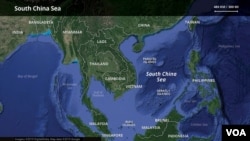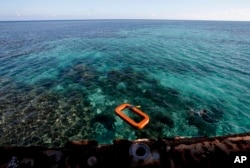ຈີນ ແລະຫວຽດນາມ ສອງປະເທດທີ່ມີການຂັດແຍ້ງກັນກ່ຽວກັບອະທິປະໄຕທາງທະເລ ເລີ້ມການເຈລະຈາກັນອີກ ຫລັງຈາກໄດ້ມີການປະເຊີນໜ້າທີ່ແກ່ຍາວມາໃນປີນີ້ ໂດຍກ້າວເຂົ້າສູ່ອັນທີ່ພວກນັກວິເຄາະເອີ້ນວ່າ ເປັນການສະແດງອອກໃນການຢາກມີສັນຕິພາບ ກ່ອນທີ່ການປະເຊີນໜ້າຕື່ມອີກຈະລະເບີດຂຶ້ນ.
ພວກນັກສັງເກດການທາງດ້ານການເມືອງ ກ່າວວ່າ ຈີນໄດ້ຖອນກຳປັ່ນສຳຫຼວດຂອງຕົນຈາກເຂດນ່ານນ້ຳ ທີ່ມີການຂັດແຍ້ງກັນ ໃນເດືອນຕຸລາທີ່ຜ່ານມາ ແລະຫວຽດນາມກໍໄດ້ເຂົ້າກຳຕຳແໜ່ງປະທານວຽນ ຂອງສະມາຄົມບັນດາປະຊາຊາດໃນເຂດເອເຊຍຕາເວັນອອກສຽງໃຕ້ຫຼືອາຊ່ຽນ ເປັນເຫດຜົນທີ່ພາໃຫ້ປະເທດທັງສອງເລີ້ມການເຈລະຈາກັນໃມນເດືອນນີ້.
ໃນມື້ວັນພຸດຜ່ານມາ ຄະນະເຮັດວຽກ ກ່ຽວກັບການຮ່ວມມືທາງທະເລລະຫວ່າງຫວຽດນາມແລະຈີນ ໄດ້ປະຊຸມກັນເປັນຮອບທີ 13 ທີ່ນະຄອນໂຮ່ຈິມິນ. ການປະຊຸມດັ່ງກ່າວ ໄດ້ນຳເອົາພວກເຈົ້າໜ້າທີ່ລະດັບກາງຂອງກະຊວງຕ່າງປະເທດແຕ່ລະຝ່າຍມາພົບພໍ້ກັນ ອີງຕາມລາຍງານຂອງອົງການຂ່າວຫວຽດນາມ.
ທ່ານຄາຣລ ເທເຢີ ສາສະດາຈານຜູ້ຊົງຄຸນນະວຸດທິຈາກມະຫາວິທະຍາໄລນິວ ຊາວເວລສ໌ ທີ່ຊ່ຽວຊານກ່ຽວກັບເຂດເອເຊຍຕາເວັນອອກສຽງໃຕ້ກ່າວວ່າ “ສຳລັບຂ້າພະເຈົ້າແລ້ວ ມັນເບິ່ງຄືວ່າ ພວກເຂົາເຈົ້າກຳລັງເຄື່ອນໄຫວໄປສູ່ການເຈລະຈາ ຍ້ອນວ່າການປະເຊີນໜ້າກັນ ບໍ່ໄດ້ຮັບໃຊ້ຈຸດປະສົງໃດໆຢ່າງເປັນການສະເພາະ.
ຈີນແລະຫວຽດນາມໄດ້ຜິດຖຽງແລະເຈລະຈາກັນມາຫຼາຍສິບເທື່ອແລ້ວ ໃນໄລຍະ 20 ປີທີ່ຜ່ານມານີ້. ຄວາມສຳພັນທາງດ້ານການທູດມີຂຶ້ນ ຫລັງຈາກທັງສອງຝ່າຍໄດ້ຝັງບັນຫາທີ່ສະເພາະເຈາະຈົງໃດນຶ່ງແລະນຶ່ງຫຼືທັງສອງຝ່າຍຢາກສະແດງພາບພົດໃຫ້ເຫັນໃນຖານະຜູ້ຮັກຫອມສັນຕິພາບ ໂດຍສະເພາະໃນຂະນະທີ່ຈີນແລະອາຊ່ຽນຈະເປີດການສົນທະນາກັນ ນັ້ນຄືຄວາມເຫັນຂອງພວກນັກຊ່ຽວຊານ. ການເຈລະຈາຂອງພວກເຂົາເຈົ້າບໍ່ໄດ້ແກ້ໄຂບັນຫາຮາເຫງົ້າໃດໆກ່ຽວກັບການມິສິດທິໃນການຄວບຄຸມທະເລຈີນໃຕ້ ທີ່ອຸດົມສົມບູນໄປດ້ວຍຊັບພະຍາກອນທຳມະຊາດນັ້ນ.
Maritime sovereignty rivals China and Vietnam have started talking again after a prolonged standoff earlier in the year, entering what analysts call a routine show of peace before more flare-ups.
China's withdrawal of a survey ship from disputed waters in October and Vietnam's ascent to chair the Association of Southeast Asian Nations led the reasons that the two began talking this month, political observers say.
On Wednesday, a Vietnam-China working group on maritime cooperation held its 13thround of talks in Ho Chi Minh City. The event brought in mid-level officials from each side's foreign ministry, Viet Nam Newsreported.
"It seems to me they're moving into a phase of talk, because the confrontation no longer serves any particular purpose," said Carl Thayer, Southeast Asia-specialist emeritus professor with the University of New South Wales in Australia.
China and Vietnam have cycled through dozens of tiffs and talks over at least the past 20 years. Diplomacy normally comes after the two sides bury a specific issue and one or both wants to boost its image as a peacemaker -- especially when a tense China-ASEAN dialogue looms -- experts have said. Their talks do not solve underlying disagreements about rights to the resource-rich South China Sea.
"China's still maintaining a firm stance on the South China Sea issue," said Nguyen Thanh Trung, Center for International Studies director at the University of Social Sciences and Humanities in Ho Chi Minh City. "They will not make many concessions to push forward for negotiations with other countries in the region."
The two neighbors with a centuries-long history of territorial disputes both claim western parts of the 3.5 million-square-kilometer sea, although China is militarily and economically stronger, which has given it more clout at sea since the 1970s. Both countries are looking for potentially vast reserves of oil and gas under the seabed.
Cycle of spats, talks
Vietnam and China typically negotiate after China moves ships or a rig into contested waters, or Vietnamese step up energy exploration. For example, talkspicked up speed in 2014 as both sides wanted to get past an incident in which Vietnamese boats had rammed Chinese counterparts near the Gulf of Tonkin over Beijing's approval for an oil rig. Then, during a meeting in Vietnam in 2017, senior officials from both sides agreed to manage disputes in the sea.
This year's standoff began in June when a Chinese energy survey ship, the Haiyang Dizhi 8, began patrolling contested waters around Vanguard Bank, 350 kilometers off the coast of southeastern Vietnam. In October a rig contracted by Vietnam said it had stopped work in the tract and a day later the survey ship retreated.
Reasons for talks this month
Vietnam should look like a negotiator, not a fighter, among regional leaders over the next year as ASEAN chair, analysts say. Beijing for its part hopes to get along with Vietnam through its term into late 2020, in case the 10-country bloc takes action on the South China Sea, they say.
"China has to confront an ASEAN with Vietnam at the chair, which has already been very, very strongly opposing China's actions," Thayer said.
The Vietnamese government wants its citizens to see it trying to work with China in case something goes wrong later, Nguyen said.Talks might produce more deals on fishing or energy exploration, he added.
"For Vietnam, because now it's the ASEAN chair, so it doesn't look good on Vietnam if it continues to adopt a more militant stance toward China, especially after China has already withdrawn that survey vessel from Vanguard bank," said Collin Koh, maritime security research fellow at Nanyang Technological University in Singapore.
In the future, though, China will still "coerce within a manageable threshold" and Vietnam will want China to stop, Koh said. The negotiations now mark a "repetition of the cycle" of struggle and reconciliation, he said.





